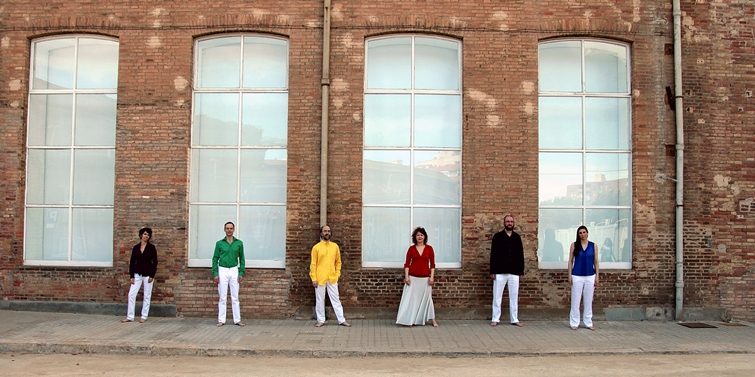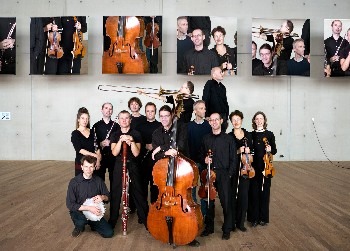
In the opening pages of “The Silmarillion”, Tolkien weaves a creation myth in which everything is brought into existence by the singing of the supreme beings. I have wondered what that music might have sounded like, and now after hearing Stockhausen’s Stimmung performed by Forum Neue Vokalmusik, my imagination at least has a starting point. Stimmung is music that sounds like nothing else, mathematically pure, and at times painfully beautiful, and so absorbing that it seemed to expand to fill the entire universe.
This was the astronomical end of tonight’s “either end of the SCALE”, the second in a set of three concerts of new music put on by Durham’s MUSICON, with each evening pairing miniature pieces with works of epic scope, taking us from the quantum to the cosmological.
At the small end of things, The Ives Ensemble filled the first part of the concert with sparkling little gems by Anton Webern, Bernd Alois Zimmermann, Helmut Lachenmann and György Kurtág. Webern’s Sechs Bagatellen for string quartet pop into existence and disappear like some of the exotic particles of quantum physics, exquisite little flashes of colour. Webern’s tone rows threaded seamlessly through the four players, and the Ives Ensemble held our attention so tightly that the void of silence that we created around the notes felt like part of the music. Kurtág’s 12 Microludes were a slightly larger take on the same idea with brief moments of rich harmony and tiny fragments of tune. The Ives Ensemble packed each fragment with intense expression; I was most moved by the eleventh, which spoke of deep sadness and alienation.

Zimmermann’s Vier Kurze Studien for solo cello and Lachenmann’s Toccatina for solo violin allowed Job ter Haar and Josje ter Haar to explore some fascinating extended techniques. Zimmermann’s cello pieces provided some of the most energetic music of the evening, particularly the spitting droplets of the second piece, whilst Lachenmann’s Toccatina is undoubtedly the quietest music I have ever heard. Most of it is played by the performer just touching the screw of the bow onto the strings, creating minuscule pinpricks of sound.
After this sparkling little overture, the audience were moved to chairs surrounding a central platform ready for Stockhausen’s Stimmung. This extraordinary work for vocal sextet with microphones is based on overtone singing built up on the natural harmonics of the human voice. The physiology and the physics are complicated, but the result is a very pure sound, particularly in the higher female registers: if you think of the sound you get from running a finger around a wine glass, the effect is similar. The best bits of Stimmung, which can mean both “tuning” and “mood” as well as being related to the word “Stimme” – (voice) are ethereally beautiful and hypnotic, music to relax and cleanse the body and soul. Stockhausen took inspiration for the piece from ruins in Mexico and an icy landscape in Connecticut, and there were definitely times when the music put me in mind of vast open spaces, where there is nothing but silence and wind. The final minutes put me into a strange, trance-like state, leaving me feeling as if I’d been drugged (apologies to the person who attempted to have a conversation with me on the way out, when I could barely speak).
There’s more to Stimmung than this ethereal music of the spheres though, and parts of it were very earthy and human. There were chants, incantations, high pitched whispery whistles and seductive breathiness, all of which was definitely a lot sexier than Stockhausen’s heavy-handed attempts at erotic poetry, declaimed by two of the men (I picked up just enough of the German to get the idea, and that was enough). The chanting of the names of gods marks it out as a piece from the hippy sixties, as do the theatricals surrounding the performance: the singers, in white trousers, each with a different coloured top, sat cross-legged on rugs and white cushions, they processed in and out individually and made deep bows at the beginning and end of the music.
I also felt that the six singers were bringing distinct personalities to the music. Of those I could see, soprano Christie Finn, directly in my line of sight, looked and sounded far too serenely happy for someone singing such difficult music, and at times she was almost laughing, whilst tenor Philip Lehmann was the one who pulled everything down to earth, and counter-tenor Beat Duddeck was calm and priestly. Parts of the music were of unspecified duration, with singers making elegant hand gestures when they were ready to hand over to the next part, which added to the sense of ritual and incantation.
Stimmung is an extraordinary piece, daring in its grandeur, and mostly achieving its immense ambitions: it’s certainly something worth taking the opportunity to hear, particularly if you’re lucky enough to encounter Forum Neue Vokalmusik, who are so supremely comfortable with Stockhausen’s masterpiece that they make it easy for the inexperienced listener.








